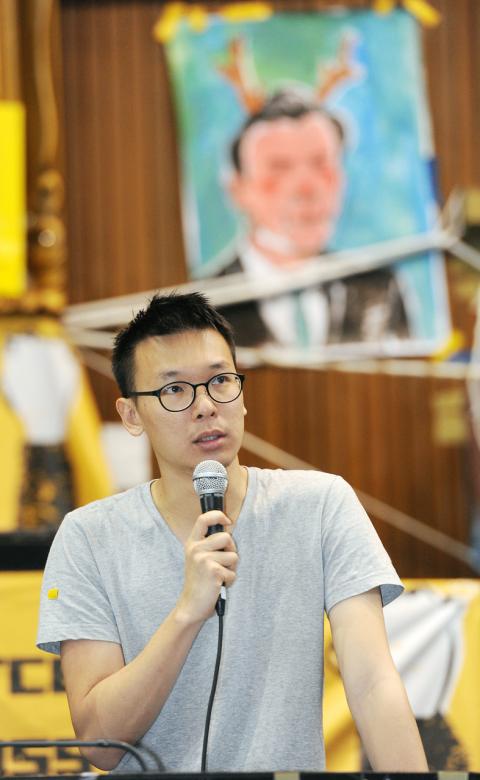One of the leaders of protesters occupying the legislative chamber said the students could not at this time accept an invitation from President Ma Ying-jeou (馬英九), who had, seven days into the occupation, finally agreed to meet with representatives from the group.
Protest leader Lin Fei-fan (林飛帆) confirmed that the group received a call on Tuesday from Presidential Office spokeswoman Lee Chia-fei (李佳霏), who delivered an invitation for student representatives to talk with the president in the Presidential Office, but Lin said that the protesters were not ready to accept it.
Lin and the activists had initially planned to accept the invitation, but upon hearing that during a cross-party negotiation in the afternoon, Chinese Nationalist Party (KMT) lawmakers had refused to allow the cross-strait service trade agreement to be returned to the Internal Administrative Committee for review, the students changed their mind about meeting with Ma.

Photo: Liu Hsin-de, Taipei Times
“We’re worried that the president is being duplicitous,” Lin told a press conference held on the legislative floor.
“He pretends to be open-minded and willing to talk with us on one hand, but he asked KMT lawmakers to block a review of the trade pact,” Lin said.
“Until Ma promises that KMT legislators will not boycott a renewed review of the agreement, we will not agree to talk with him,” the student leader added.
He added that the talk should involve other social groups and should be held in public, such as on Ketagalan Boulevard in front of the Presidential Office.
Lee said the president still expects to speak with the students under no preconditions and that the Presidential Office would agree to allow media participation in the meeting.
“It looks like, at the moment, the students have yet to reach a consensus among themselves, and we will wait until they are ready to respond to our invitation,” she said.
“We will try our best to arrange a meeting with the student activists,” she added.

DAREDEVIL: Honnold said it had always been a dream of his to climb Taipei 101, while a Netflix producer said the skyscraper was ‘a real icon of this country’ US climber Alex Honnold yesterday took on Taiwan’s tallest building, becoming the first person to scale Taipei 101 without a rope, harness or safety net. Hundreds of spectators gathered at the base of the 101-story skyscraper to watch Honnold, 40, embark on his daredevil feat, which was also broadcast live on Netflix. Dressed in a red T-shirt and yellow custom-made climbing shoes, Honnold swiftly moved up the southeast face of the glass and steel building. At one point, he stepped onto a platform midway up to wave down at fans and onlookers who were taking photos. People watching from inside

MAKING WAVES: China’s maritime militia could become a nontraditional threat in war, clogging up shipping lanes to prevent US or Japanese intervention, a report said About 1,900 Chinese ships flying flags of convenience and fishing vessels that participated in China’s military exercises around Taiwan last month and in January last year have been listed for monitoring, Coast Guard Administration (CGA) Deputy Director-General Hsieh Ching-chin (謝慶欽) said yesterday. Following amendments to the Commercial Port Act (商港法) and the Law of Ships (船舶法) last month, the CGA can designate possible berthing areas or deny ports of call for vessels suspected of loitering around areas where undersea cables can be accessed, Oceans Affairs Council Minister Kuan Bi-ling (管碧玲) said. The list of suspected ships, originally 300, had risen to about

A Vietnamese migrant worker yesterday won NT$12 million (US$379,627) on a Lunar New Year scratch card in Kaohsiung as part of Taiwan Lottery Co’s (台灣彩券) “NT$12 Million Grand Fortune” (1200萬大吉利) game. The man was the first top-prize winner of the new game launched on Jan. 6 to mark the Lunar New Year. Three Vietnamese migrant workers visited a Taiwan Lottery shop on Xinyue Street in Kaohsiung’s Gangshan District (崗山), a store representative said. The player bought multiple tickets and, after winning nothing, held the final lottery ticket in one hand and rubbed the store’s statue of the Maitreya Buddha’s belly with the other,

Japan’s strategic alliance with the US would collapse if Tokyo were to turn away from a conflict in Taiwan, Japanese Prime Minister Sanae Takaichi said yesterday, but distanced herself from previous comments that suggested a possible military response in such an event. Takaichi expressed her latest views on a nationally broadcast TV program late on Monday, where an opposition party leader criticized her for igniting tensions with China with the earlier remarks. Ties between Japan and China have sunk to the worst level in years after Takaichi said in November that a hypothetical Chinese attack on Taiwan could bring about a Japanese